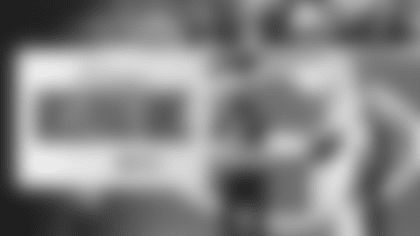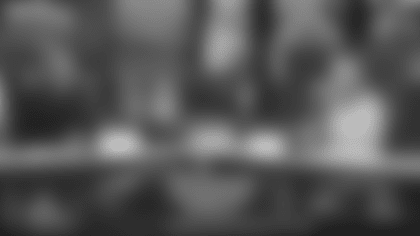BB: So this is getting us ready for a regular season Friday. What do you have?
**Q: With Dedric Ward, he has been coming along. Does that make the decision all that more difficult for you?
BB:** Sure. Absolutely. When a lot of players in one position are playing well, that does make decisions harder. Dedric has had a nice camp. He's come in and has done a nice job in a lot of areas, catching the ball, his route running, getting open, he's made some plays on long and deep balls, third down, he helped us out in the punt returning area. He's had a real solid camp and when you have competition like that, it definitely makes it harder to make a decision. It's a lot easier when one guy is real good and the other guy is not playing very well.
**Q: Does the fact that he was in Charlie Weis' system before help?
BB:** Well, yes. I think that we all know that different players fit differently in different systems. Dedric was successful in that system in New York and we are in a very similar one to that now. It's not really surprising to myself or Charlie, that he's been able to do things that we have all seen him do before and the same plays that we ran there are some of the same of the same plays here.
**Q: Understanding that you can do what you want with the roster, are six receivers difficult to keep?
BB:** I will answer that question in a couple of ways. First of all, we have kept six before. Like everything else, if you keep more there, you keep less somewhere else. The thing about that though, I would say, is that we have to inactivate eight players every game anyway. So, whether you inactivate your, let's say for example, sixth receiver or your tenth offensive lineman or your eleventh defensive back, whatever it is, your fourth tight end, or maybe a third tight end, whoever those inactive players are, eight players have to be inactive. Keeping a guy on a roster, that is one thing. Getting him to the game that is something else. You talk about taking six receivers to the game, that is something I don't think we have ever done. That is a horse of a different color when you start talking about your game day activations. Carrying six on a roster, if you did that, then you just have to trim it somewhere else.
**Q: How about the running backs?
BB:** I think not as much, just because running backs and receivers, they are really pretty separate entities. It's the backs and the tight ends that are…not that they do the same things, but they take up some of the same spots offensively, where the competition might come in between backs and receivers might be in the kicking game. There, again, some of the backs are going to be competing with the tight ends, the linebackers, the safeties, that group of people. I think those are a little bit separate. I'm not saying they would never cross over, but I think there is more competition with other positions than there is at that one.
**Q: How do you weigh the difference between the veteran guy who can help out now as opposed to the younger player who looks promising? Is that the hardest thing you have to do?
BB:** Yes. It is. It is the hardest decision you have to make because you are trying to project where that younger player is going to be relative to more of the known entity. It's tough. Sometimes you are right and sometimes you are wrong on those. Sometimes those young guys never make it to that level and then sometimes they go past it. Sometimes you wait two or three years for them to get to it and you might be better off keeping the veteran player who is going to give you three years of consistent play during that time while you are waiting for the younger guy to catch up. That is certainly not an exact science. That is why you see some of the player movement that you see towards the end of training camp and the beginning of the regular season when the roster shuffling, just people trying to make those same projections and evaluate those young players relative to the players on their team. That is a tough decision. Each one is a little bit different. In the end, those are the one's that keep you up at night.
**Q: Since the institution of the salary cap, has that become a factor? Does it tend to sway it more toward the younger player?
BB:** The thing on the salary cap, I think right now, it's not absolute but in most cases, the salary cap isn't that big of a factor right now because everybody has their 80 players and everybody is under the cap. If you made a decision based on salary cap now, I don't want to say it's marginal, but it's different than when you make a decision in March or April on the salary cap where you can either have one player or the other on your team. Now you are in a situation where you have who you have and basically you would want to take your best players and put them out there. I am not saying that the salary cap has no effect because there might be some situations where it would, but for the most part, I think as a coach, you are looking to put your best team out there on the field and you are already under the cap at this point.
**Q: Have you been pleased with the offensive line and their progress in this camp?
BB:** I think we have progressed. Again, it is early. It's too early. We have to see how we do against the teams that we are going to see. All four teams in preseason have good defensive lines, they have good fronts. I think we will get a real good evaluation of those guys as they play in preseason. I think that so far they have worked hard and they have worked together. We have some young guys there. We have a couple of older players that are providing good leadership for the group. We just have to see how it plays out. With the offensive line more than with any other position, that's really a collection of five people because so many things are combination, two guys working together, three guys working together, to get something done. It's not just a question of pure talent, where you have a receiver running a route against a cornerback. Here, you are really working in a group and it's how the whole group functions together. Even if you feel like you have the right players there, there is still a process of those players working together and being efficient and doing their job.
**Q: When one guy goes down how does that affect everyone else?
BB:** Well that is why you have training camp. At the same time you want to bring everybody along, you do enough changing so that players get familiar with playing with different people and different combinations in the event that comes up sooner or later during the season. You try to prepare for that. In the end, you would like to have the same five guys out there every game for 16 games for 10 years in a row. You also have to prepare for when that isn't the case.
**Q: How much will we see Rohan Davey on Thursday?
BB:** You will see him. We will try to give everybody a chance to play. It's hard to pinpoint and say specifically how much playing time each player will get. We will try to do the best we can to give everybody the amount of playing time that we think is appropriate. Some guys are going to play more than others and you always like to see the younger players get a good opportunity providing that they have shown you that they are ready for it and certainly Rohan has. I am just saying with some other younger players, we still need for them to, in some cases, show that they are actually ready to go out on the field and do it. But you will definitely see Rohan in the game.
**Q: What type of camp has he had? What do you expect from him?
BB:** First of all, I think that Ro is way ahead of where he was last year. He has a much better grasp of the system, the terminology, the adjustments, the route adjustments, the audibles, all of those kinds of things. He is way ahead of where he was last year. From that standpoint, it's been a big jump. How that translates into on the field performance, we will just have to wait and see. But to this point, there has certainly been improvement, he has only had a few quarters of play in the National Football League and none of those in the regular season or only a couple of plays in the regular season. Game conditions for the quarterbacks are really everything. So much of it is game management and tempo and making decisions and you go through practice you try to prepare them as much as you can for that but nobody is hitting the quarterbacks, everybody is giving them a chance to throw for the obvious reasons. The game is at a different tempo and you simulate it the best you can, but it's just not the same as game conditions. He will get a chance and hopefully he will do well because he has worked and he's made a lot of improvement. But we will just have to wait and see until he gets on the field.
**Q: Does Kevin Faulk have the opportunity to start this season?
BB:** Well, Kevin played well in the opportunities he had last year. He is having a good camp and we'll give Kevin the opportunities and what he is able to do with them will determine what his role and how much of a role he will have this year on all downs, first, second, third and fourth.
**Q: On Jeremy Shockey, is this a pretty good test in the preseason?
BB:** He is as good as it gets. He is really a dynamic player. He plays with a tough attitude. He is an outstanding receiver and he uses his size well. He has good hands and is tough after the catch. He is pretty good. It will be a real good test for us. We saw him last year for however long he played, a quarter-and-a-half, whatever it was. His game has certainly grown a lot from that point. He is one of the top players in the league at his position already. He has established himself well.
**Q: You said that you were working on a regular season game week schedule. Are you seeing a Friday 'edginess' from the troops?
BB:** I think it's a little different from the regular season. Yes. Again, we are trying to pull everything together. We have covered a lot of ground. We have painted some broad strokes and now we are trying to fine tune things specifically for the game. The one big difference now and say on a normal Friday in the regular season when we played, whatever it is 5, 6, 7, 8 games, we covered all of the situations and have probably been in a lot of those situations at some point or another during the course of the year. Now we are at the point where we are going over those situations and none of them have come up, other than in a practice setting and a lot of our players, some of the new players and some of the younger players have never experienced those, ball on our own one-yard line coming out or kickoff return after a safety, all of those different kind of situations, fourth-and-one, those type of things. Here is what we want to do, here is how we want to try to do it, we practiced it, it's a little bit different in the game with the clock running and all of other things that are going on, substitutions, the field conditions and wind and what have you, a lot of things can affect those decisions. When you actually get in them and have them in game conditions, sometimes they are a little bit easier to teach off of. We've covered them pretty thoroughly, but still we need for them to come up and go through tem. Whereas when you go through them two months from now a lot of these will be, 'Yeah, that came up in the Giants game.' Like last year's game against the Giants. [There were] two kickoff's that were out of bounds, one punt that could have easily been downed on the one-yard line. There were some big plays in the kicking game. There were a couple of unusual plays on offense or a couple of fourth down plays, things like that. You don't know what is going to come up but you just try to cover all of your bases and I am sure [there will be] a lot of good situations we'll be able to learn from them after Thursday night.
**Q: Is Rohan's jump similar to [Tom] Brady's jump from year one to year two? Is it possible that he could be a back-up for Tom?
BB:** That is possible. I think it's a little too early to measure Ro's improvement since the fact that we haven't played any preseason games. Tom's preseason in the '01 training camp was good. We'll wait and see how Ro does.
**Q: Have you been surprised about anything at this point in camp?
BB:** I think when you go through the mini-camps and the passing camps, you have a pretty good idea of what everybody can do, especially the skilled players. Then when you get to training camp, you see the contact and you get a better idea, a better gauge on the contact. I think for the most part, I think surprise maybe is not the word I would use. But to me it's more of a gradual evolution of players getting better and improving day-by-day. How far they have come in two weeks, relative to other players that may not be making improvement at the same rate. Training camp is such a short-tem situation. You are just day-to-day, play-to-play, and minute-to-minute, that is so much of your focus. Then there is certain point; maybe it's after the second preseason game or third or fourth one, where you have seen enough in practice, you've seen enough in the game situations where, then, things start to come together. I am not saying that they can't come together before that. There is a point where it starts to fall in place. I've been on staff's and I've been in training camps where you have four or five hour meetings at night that go until one or two in the morning talking about your team at this point in the season. Then two weeks later, things change and they are just not quite the same. I feel like this is the time where you just want to try to get everybody trained, put them out on the field, let them play, see what they can do and make the evaluations based on what they are able to produce. That is pretty much what we are going to try to do.
**Q: When is the crucial point in camp when you have to cut guys?
BB:** When you are sure.
**Q: When is that?
BB:** Whenever you are sure. Whenever you know that this is the way it's going to be. Sometimes it's two weeks into training camp. Not often, but sometimes you see that. Lawrence Taylor, in the first two weeks of training camp, we could see where he was going to be. As soon as you know what it is, you might as well and go ahead and do it. With Ben Kelly, we made a decision on him last week. The reason why we made it was because we knew what the right decision was. Other decisions can go on and some decisions you are forced to make when you get to the final roster cuts, you might want another day. You might want another week, but you don't have it, then you have to do something there. You have to draw the line. I think what you don't want to do at this point is make the wrong decision when you don't have to. If you are not sure, if there is still some new information that could come in that might change it then you let it play itself out. Once you feel like you are sure about the direction that you are going to go, then you might as well set sail and get going.
**Q: Are you surer on other positions?
BB:** Oh, sure. I think there are some things that we are surer on right now than others. There is no question about that. Even in those cases, you want to do due diligence and give everybody an opportunity and also wait and make sure that even the players that you are counting or some of the plays that you are counting are still going to be as productive as you think they are and sometimes those things change. Injuries are an obvious thing that can change things in a hurry that you can't ever predict or prepare for. You just have to react to them. Sometimes you get in a situation where you feel like okay here is going to be our, whatever the position is, five running backs and we don't really need this sixth guy. All of a sudden, one of those five leaves and you only have four and now that sixth guy all of sudden becomes real important. You don't want to discard the cards out of your hand before you have to. In training camp, as long as they are out there and as long they are competing, I think anything can happen.
**Q: Some coaches say by the third preseason game. Do you use that as a barometer?
BB:** You've got to be pretty far along by that point. You've only got another week and your final cut is coming up after one more game. I think in a lot of cases you are pretty far along in that point. Not all of them, again, I just think it depends on the situation.
**Q: Can you talk a little bit about the importance of this game for the younger players?
BB:** Well I think the importance of this game for those young players is what it will lead to in the next game and the game after that. We only have so many snaps out there and we can't play everybody. We have 86 players on the roster, 85, whatever it is. I am losing count. We can't play them all. Everybody gets so many opportunities and the guys that do well with those opportunities will get more opportunities than the guys who don't do well with them. It's important for those players to get from game one to game two. If those opportunities increase for them in game two and they do well then that will build well for them in game three. Each practice, each play, and certainly each preseason game just by the limited number of plays that there are, there are significant opportunities for those young players. Any player that hasn't established himself in the league and even the ones that have need to go back out and re-establish it again.
**Q: How is Joe Andruzzi progressing so far?
BB:** Joe practiced yesterday with the team for the first time in pads. He's been rehabbing. He's got to start somewhere and so he has started and that is good. It is good that he has progressed to that point. We'll get him some more reps with the team and build up his confidence in the contact in team settings by doing individual drills and by doing one-on-one's and two-on-two's and that kind of thing. Eventually, when he is ready, then we will integrate him with the rest of the group.
**Q: Was there ever a point where you were concerned about his genuine health like when he had that mysterious virus?
BB:** From a year ago?
**Q: Yes.
BB:** Right, well we got over that. Joe has fought through a couple of injuries. I think he has had a good offseason this year. Probably the best that he has had since I've been here. We expected that he would be able to practice with the team at about this time. You never know for sure because you wait and see how the rehab goes. It's good to have him out there and it will be good when he has progressed far enough to work with the team on a regular basis and not be limited in any way. But it's going to take him a little while to catch up to where everybody else is. These guys have been out here working for two, two and a half weeks, and if they haven't been doing that, they just can't step out on the field and one day be ready to keep up with the rest of the group. The other guys are just too far ahead.
**Q: How did Willie McGinest look on his first day back?
BB:** Okay. He is very similar to Andruzzi. I would say the same type of comments as I would say about Joe. It's good to have him back out there. He hasn't been playing football. He's been exercising and getting himself ready to go. Now the reads and the reactions and the football techniques and all of that in pads against good competition, those are the things that players who haven't been out there on the field practicing need to accomplish. Joe and Willie both would be in the same category there.
**Q: Will either of them play on Thursday?
BB:** No. You will not see them Thursday. You might see them, but they won't play.
**Q: With the two rookie corners Eugene Wilson and Asante Samuel, you've brought them along slowly. Can you talk a little bit about the decisions that go into managing each rookie and when the right time is to set them free so to speak?
BB:** That is a tough question. It really is. Each case is different. It's hard to say specifically when that is for each guy. Each case is different. Again, I would go back to either, a) when the player is ready or b) sometimes it's just do to need. For example, the first year when Jace Sayler started, obviously that was more of a need situation and he went in there and he played in the opener against Tampa. In most cases what you like to do is put them in when they are ready not because you are forced to put them in because of injuries or lack of depth at the position. In this case, Asante and Eugene have gotten a lot of snaps in practice and [we] feel like we want to see what they do with that type of opportunity in game conditions, which I am sure that you all evaluate it before we do. We'll evaluate how that goes and go from there.
**Q: Is there any risk to that? These guys have to have a certain mentality to be a cornerback any way. Like if something goes wrong, does it affect their confidence?
BB:** Yes. I think there is. I've talked to both players. I know that our coaches have talked to them and maybe some of the other players have talked to them as well. I think in a situation like this, as a coach, make sure that you explain to the player what you are doing, why you are doing it and make sure that he understands it. At the same time, if any young player, whether he is a rookie or where he was drafted or anything else, sooner or later, they are going to have to play anyway. I plan on being at all of the games, the stadium is sold out, they are going to have to play in front of everybody sooner or later. You hope it's when they are ready. But sometimes it might be a little bit early before they really are. I think in the end that players learn from those situations more than it breaks them down. That is a possibility.
**Q: Do you try to get the point across that they might get beat once, that it's not really a big deal because you are also looking at other things?
BB:** Well, we certainly don't want to say to them that mistakes are okay and it's okay to get beat and it's okay to give up a bunch of touchdowns, we're not saying that. We all know that they are going to catch a pass on a corner, a receiver is going to drop a ball, a quarterback is going to throw and interception, and a linebacker is going to miss a tackle. Eventually, they are going to happen to the best players. The important thing is for the players to a) be prepared for the game and their jobs and their responsibilities, b) to go out there and execute the proper fundamentals and techniques that they have been instructed to do and to make sure that they know what to do and they don't miss assignments and c) to play hard and to give tough effort and if they do that, then it is easier to evaluate. You can really see what the guy can do. Sure there are going to be some mistakes, they will get corrected and they will improve them the next time. If a player can put himself in that situation, then I think it will be a beneficial situation and a beneficial experience for the player. If he can't then there is going to be some re-evaluating that is going to have to take place, both on the player and if he is not able to do those things and on the coaching end, whether or not how much you want to ask him to do it the next time.
**Q: [on making technique changes as a rookie]
BB:** In all honesty, there is less of that from rookies although, I have seen it on occasion, it's more common with veterans. Veterans who have been successful to whatever degree doing something a certain way in certain techniques and then trying to get them to adapt to yours which are a little bit different. There are a couple of different ways you can handle it. The way I usually handle it, if the player has been fairly successful in his career, I just come right out and tell him, 'If you want to do it your way, you can do it your way. Here is the framework, you still have a job to do. You might not use the exact same technique that we're teaching the rest of our players here but you still have a job to do. If your job is to jam the receiver and be the force player on the run, we're not getting away from that. But if you want to do it from a staggered stance instead of a parallel stance and we talk about it and so forth, we might be able to cross that bridge.' I would be very open with a player and tell him, 'If that is not going well, then I am going to try to change it and try to get you to do it the way that we think is right.' A good example of that is, probably the best example for me in my coaching career is Everson Walls in 1990 with the Giants. Walls, as we all know, had a great career with the Cowboys. He was a very unorthodox and used techniques in the secondary that I don't think maybe any other player would be successful doing. He broke a lot of rules and a lot of fundamental principals that you teach defensive football players and yet he was very successful. He continued to be successful in our system doing it that way. We were able to work well together on that and it was a good learning experience for me because I actually learned how he was able to do it. But at the same time, I openly told our other players, 'Look, and I don't want any of you guys doing it that way.' But that is the way that Everson did it and he was productive and successful doing that. You have to manage it that way. As long as he can be successful, that is what we are counting on is production and a guy that can do his job, if it's not quite the way we want it done, as long as he is able to do it and players have different styles. They are not all the same. A good example of that was in New York with Aaron Glenn was one corner and Marcus Coleman was another. One guy is 5'8, 180 pounds and the other guys is 6'2, 210 pounds or whatever he was. Their styles would obviously be contrasting. And we tried to make some accommodations for that. In the end, if you have a job to do, you still have to get it done because the other 10 guys on the field are counting on that. It's a balance. The rookies are usually more ready to go along with the program. Every once in a while you get a guy who's got all the answers. Most of the time, they are at least willing to accept and try what you want them to do. Sometimes if a guy has a real problem with it, then you try to alter it so that you meet him in the middle somewhere. Especially in a situation where you have a specialist there, say a thrower or a kicker or a returner or somebody like that, where it's more of an individual skill, if you will. Like for example Davey, or [Kliff] Kingsbury, to take their throwing mechanics and just totally change them with what might be in the end more detrimental to the player than maybe trying to take his natural throwing motion that he has already developed and try to refine it a little bit.
**Q: Do you try to gauge that with free agents and see how willing they are to accept change?
BB:** Sure. We try to do that and we try to talk to them about that especially when we have seen them play. 'Look, we know this is the way you have done it, these are some of the things that we do a little bit differently.' And sure, that is part of getting to know the player and kind of getting a feel for what his attitude and approach is to doing that and how adaptable he is. Again, in looking at football players through the years, I've been fortunate to have an opportunity to see a lot of them, guys that don't make any changes or don't make any adjustments, very seldom are able to improve their game. How do you get better if you just do it the same way all the time? Where do you show improvement? At some point along the line, if a player wants to move upward in his performance, he needs to take something that he is not doing as well as he could and somehow get it to be better. Whether that is work harder, whether it's change it a little bit, whether it's a mental thing, whatever it is, but there has got to be someway for a player to improve and as a Coach you can instruct him. But as a player, again, he has to be open minded enough to accept some type of a change, not just football, it's really anything. I don't know how else you can get better unless you do something to make it better. There needs to be a certain open-mindedness in the whole process with the player.











































